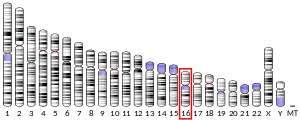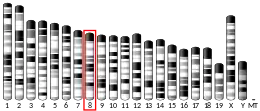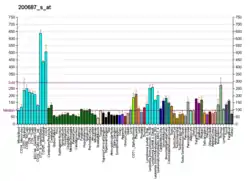SF3B3
Splicing factor 3B subunit 3 is a protein that in humans is encoded by the SF3B3 gene.[5][6]
| SF3B3 | |||||||||||||||||||||||||||||||||||||||||||||||||||
|---|---|---|---|---|---|---|---|---|---|---|---|---|---|---|---|---|---|---|---|---|---|---|---|---|---|---|---|---|---|---|---|---|---|---|---|---|---|---|---|---|---|---|---|---|---|---|---|---|---|---|---|
| Identifiers | |||||||||||||||||||||||||||||||||||||||||||||||||||
| Aliases | SF3B3, RSE1, SAP130, SF3b130, STAF130, splicing factor 3b subunit 3 | ||||||||||||||||||||||||||||||||||||||||||||||||||
| External IDs | OMIM: 605592 MGI: 1289341 HomoloGene: 6579 GeneCards: SF3B3 | ||||||||||||||||||||||||||||||||||||||||||||||||||
| |||||||||||||||||||||||||||||||||||||||||||||||||||
| |||||||||||||||||||||||||||||||||||||||||||||||||||
| |||||||||||||||||||||||||||||||||||||||||||||||||||
| |||||||||||||||||||||||||||||||||||||||||||||||||||
| |||||||||||||||||||||||||||||||||||||||||||||||||||
| Wikidata | |||||||||||||||||||||||||||||||||||||||||||||||||||
| |||||||||||||||||||||||||||||||||||||||||||||||||||
This gene encodes subunit 3 of the splicing factor 3b protein complex. Splicing factor 3b, together with splicing factor 3a and a 12S RNA unit, forms the U2 small nuclear ribonucleoproteins complex (U2 snRNP). The splicing factor 3b/3a complex binds pre-mRNA upstream of the intron's branch site in a sequence independent manner and may anchor the U2 snRNP to the pre-mRNA. Splicing factor 3b is also a component of the minor U12-type spliceosome. Subunit 3 has also been identified as a component of the STAGA (SPT3-TAF(II)31-GCN5L acetylase) transcription coactivator-HAT (histone acetyltransferase) complex, and the TFTC (TATA-binding-protein-free TAF(II)-containing complex). These complexes may function in chromatin modification, transcription, splicing, and DNA repair.[6]
Interactions
SF3B3 has been shown to interact with SF3B1,[5][7] Transcription initiation protein SPT3 homolog[8] and TAF9.[8]
References
- GRCh38: Ensembl release 89: ENSG00000189091 - Ensembl, May 2017
- GRCm38: Ensembl release 89: ENSMUSG00000033732 - Ensembl, May 2017
- "Human PubMed Reference:". National Center for Biotechnology Information, U.S. National Library of Medicine.
- "Mouse PubMed Reference:". National Center for Biotechnology Information, U.S. National Library of Medicine.
- Das BK; Xia L; Palandjian L; Gozani O; Chyung Y; Reed R (February 2000). "Characterization of a Protein Complex Containing Spliceosomal Proteins SAPs 49, 130, 145, and 155". Mol Cell Biol. 19 (10): 6796–802. doi:10.1128/mcb.19.10.6796. PMC 84676. PMID 10490618.
- "Entrez Gene: SF3B3 splicing factor 3b, subunit 3, 130kDa".
- Will, Cindy L; Urlaub Henning; Achsel Tilmann; Gentzel Marc; Wilm Matthias; Lührmann Reinhard (September 2002). "Characterization of novel SF3b and 17S U2 snRNP proteins, including a human Prp5p homologue and an SF3b DEAD-box protein". EMBO J. 21 (18): 4978–88. doi:10.1093/emboj/cdf480. ISSN 0261-4189. PMC 126279. PMID 12234937.
- Martinez, E; Palhan V B; Tjernberg A; Lymar E S; Gamper A M; Kundu T K; Chait B T; Roeder R G (October 2001). "Human STAGA Complex Is a Chromatin-Acetylating Transcription Coactivator That Interacts with Pre-mRNA Splicing and DNA Damage-Binding Factors In Vivo". Mol. Cell. Biol. 21 (20): 6782–95. doi:10.1128/MCB.21.20.6782-6795.2001. ISSN 0270-7306. PMC 99856. PMID 11564863.
Further reading
- Nomura N, Miyajima N, Sazuka T, et al. (1995). "Prediction of the coding sequences of unidentified human genes. I. The coding sequences of 40 new genes (KIAA0001-KIAA0040) deduced by analysis of randomly sampled cDNA clones from human immature myeloid cell line KG-1". DNA Res. 1 (1): 27–35. doi:10.1093/dnares/1.1.27. PMID 7584026.
- Nomura N, Miyajima N, Sazuka T, et al. (1995). "Prediction of the coding sequences of unidentified human genes. I. The coding sequences of 40 new genes (KIAA0001-KIAA0040) deduced by analysis of randomly sampled cDNA clones from human immature myeloid cell line KG-1 (supplement)". DNA Res. 1 (1): 47–56. doi:10.1093/dnares/1.1.47. PMID 7584028.
- Bonaldo MF; Lennon G; Soares MB (1997). "Normalization and subtraction: two approaches to facilitate gene discovery". Genome Res. 6 (9): 791–806. doi:10.1101/gr.6.9.791. PMID 8889548.
- Mintz PJ, Patterson SD, Neuwald AF, et al. (1999). "Purification and biochemical characterization of interchromatin granule clusters". EMBO J. 18 (15): 4308–20. doi:10.1093/emboj/18.15.4308. PMC 1171507. PMID 10428969.
- Brand M, Moggs JG, Oulad-Abdelghani M, et al. (2001). "UV-damaged DNA-binding protein in the TFTC complex links DNA damage recognition to nucleosome acetylation". EMBO J. 20 (12): 3187–96. doi:10.1093/emboj/20.12.3187. PMC 150203. PMID 11406595.
- Gangloff YG, Pointud JC, Thuault S, et al. (2001). "The TFIID Components Human TAFII140 and Drosophila BIP2 (TAFII155) Are Novel Metazoan Homologues of Yeast TAFII47 Containing a Histone Fold and a PHD Finger". Mol. Cell. Biol. 21 (15): 5109–21. doi:10.1128/MCB.21.15.5109-5121.2001. PMC 87236. PMID 11438666.
- Will CL, Schneider C, MacMillan AM, et al. (2001). "A novel U2 and U11/U12 snRNP protein that associates with the pre-mRNA branch site". EMBO J. 20 (16): 4536–46. doi:10.1093/emboj/20.16.4536. PMC 125580. PMID 11500380.
- Martinez E, Palhan VB, Tjernberg A, et al. (2001). "Human STAGA Complex Is a Chromatin-Acetylating Transcription Coactivator That Interacts with Pre-mRNA Splicing and DNA Damage-Binding Factors In Vivo". Mol. Cell. Biol. 21 (20): 6782–95. doi:10.1128/MCB.21.20.6782-6795.2001. PMC 99856. PMID 11564863.
- Jurica MS, Licklider LJ, Gygi SR, et al. (2002). "Purification and characterization of native spliceosomes suitable for three-dimensional structural analysis". RNA. 8 (4): 426–39. doi:10.1017/S1355838202021088. PMC 1370266. PMID 11991638.
- Scott MP, Zappacosta F, Kim EY, et al. (2002). "Identification of novel SH3 domain ligands for the Src family kinase Hck. Wiskott-Aldrich syndrome protein (WASP), WASP-interacting protein (WIP), and ELMO1". J. Biol. Chem. 277 (31): 28238–46. doi:10.1074/jbc.M202783200. PMID 12029088.
- Will CL, Urlaub H, Achsel T, et al. (2002). "Characterization of novel SF3b and 17S U2 snRNP proteins, including a human Prp5p homologue and an SF3b DEAD-box protein". EMBO J. 21 (18): 4978–88. doi:10.1093/emboj/cdf480. PMC 126279. PMID 12234937.
- Strausberg RL, Feingold EA, Grouse LH, et al. (2003). "Generation and initial analysis of more than 15,000 full-length human and mouse cDNA sequences". Proc. Natl. Acad. Sci. U.S.A. 99 (26): 16899–903. Bibcode:2002PNAS...9916899M. doi:10.1073/pnas.242603899. PMC 139241. PMID 12477932.
- Cavusoglu N; Brand M; Tora L; Van Dorsselaer A (2003). "Novel subunits of the TATA binding protein free TAFII-containing transcription complex identified by matrix-assisted laser desorption/ionization-time of flight mass spectrometry following one-dimensional gel electrophoresis". Proteomics. 3 (2): 217–23. doi:10.1002/pmic.200390030. PMID 12601814. S2CID 6035986.
- Li J, Hawkins IC, Harvey CD, et al. (2003). "Regulation of Alternative Splicing by SRrp86 and Its Interacting Proteins". Mol. Cell. Biol. 23 (21): 7437–47. doi:10.1128/MCB.23.21.7437-7447.2003. PMC 207616. PMID 14559993.
- Ota T, Suzuki Y, Nishikawa T, et al. (2004). "Complete sequencing and characterization of 21,243 full-length human cDNAs". Nat. Genet. 36 (1): 40–5. doi:10.1038/ng1285. PMID 14702039.
- Will CL, Schneider C, Hossbach M, et al. (2004). "The human 18S U11/U12 snRNP contains a set of novel proteins not found in the U2-dependent spliceosome". RNA. 10 (6): 929–41. doi:10.1261/rna.7320604. PMC 1370585. PMID 15146077.
- Jin J, Smith FD, Stark C, et al. (2004). "Proteomic, functional, and domain-based analysis of in vivo 14-3-3 binding proteins involved in cytoskeletal regulation and cellular organization". Curr. Biol. 14 (16): 1436–50. doi:10.1016/j.cub.2004.07.051. PMID 15324660. S2CID 2371325.
- Gerhard DS, Wagner L, Feingold EA, et al. (2004). "The Status, Quality, and Expansion of the NIH Full-Length cDNA Project: The Mammalian Gene Collection (MGC)". Genome Res. 14 (10B): 2121–7. doi:10.1101/gr.2596504. PMC 528928. PMID 15489334.
- Ewing RM, Chu P, Elisma F, et al. (2007). "Large-scale mapping of human protein–protein interactions by mass spectrometry". Mol. Syst. Biol. 3 (1): 89. doi:10.1038/msb4100134. PMC 1847948. PMID 17353931.




